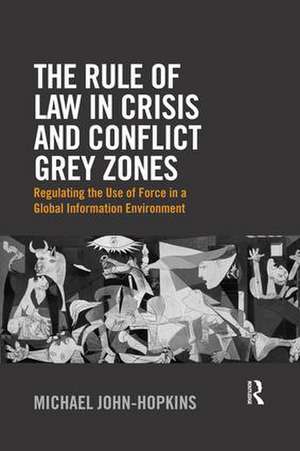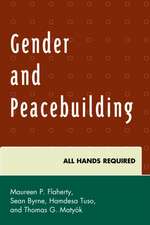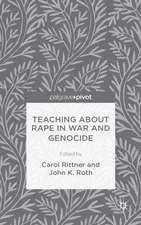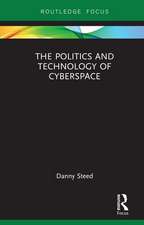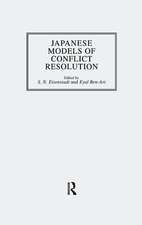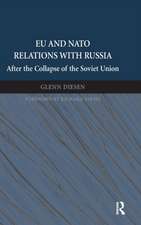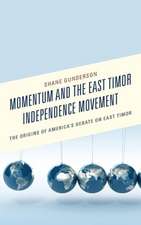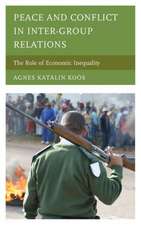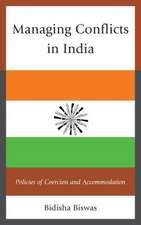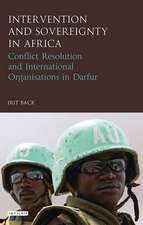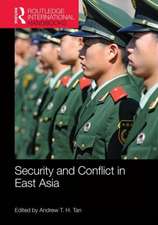The Rule of Law in Crisis and Conflict Grey Zones: Regulating the Use of Force in a Global Information Environment
Autor Michael John-Hopkinsen Limba Engleză Paperback – 4 sep 2018
| Toate formatele și edițiile | Preț | Express |
|---|---|---|
| Paperback (1) | 418.35 lei 6-8 săpt. | |
| Taylor & Francis – 4 sep 2018 | 418.35 lei 6-8 săpt. | |
| Hardback (1) | 1116.27 lei 6-8 săpt. | |
| Taylor & Francis – 13 dec 2016 | 1116.27 lei 6-8 săpt. |
Preț: 418.35 lei
Nou
Puncte Express: 628
Preț estimativ în valută:
80.05€ • 84.03$ • 66.44£
80.05€ • 84.03$ • 66.44£
Carte tipărită la comandă
Livrare economică 10-24 aprilie
Preluare comenzi: 021 569.72.76
Specificații
ISBN-13: 9780367025106
ISBN-10: 0367025108
Pagini: 350
Ilustrații: 15
Dimensiuni: 156 x 234 x 19 mm
Greutate: 0.5 kg
Ediția:1
Editura: Taylor & Francis
Colecția Routledge
Locul publicării:Oxford, United Kingdom
ISBN-10: 0367025108
Pagini: 350
Ilustrații: 15
Dimensiuni: 156 x 234 x 19 mm
Greutate: 0.5 kg
Ediția:1
Editura: Taylor & Francis
Colecția Routledge
Locul publicării:Oxford, United Kingdom
Public țintă
PostgraduateCuprins
Contents
Preface and Acknowledgements
Table of Cases
Table of International Treaties, Statutes and Protocols
List of Figures
List of Abbreviations
Introduction
Avoiding The Strategic Costs of Civilian Harm Through the Effective Use Of Force
Chapter 1
The Contemporary Theatre of Operations
Chapter 2
A General Critique of IHL Targeting And Weaponry Norms and Institutions
Chapter 3
Reconceptualising the Regulation of the Use Of Force in Situations of Crisis and Unconventional Conflict: Enhanced contextual status determination
Chapter 4
Reconceptualising the Regulation of the Use Of Force in Situations of Crisis and Unconventional Conflict: Individual status determination
Chapter 5
Towards a clearer framework for distinguishing those who participate directly in hostilities from those who are to be protected as civilians: extrapolating models of accessorial liability and co-perpetration in the commission of harmful acts
Chapter 6
Reconceptualising Targeting and Weaponry Law for the Unconventional Theatre of Operations
Chapter 7
Weaponry law: Emerging Approaches to the Regulation of Means of Warfare and Law Enforcement
Chapter 8
Regulating Military Operations Abroad: the Extraterritorial Effect of Human Rights and the potential Modalities of Parallel Application of the Right to Life under Human Rights Law and International Humanitarian Law
Chapter 9
Conclusions : Grey Zones of War and Peace in Our Globally Networked Information Environment
Bibliography
Index
Preface and Acknowledgements
Table of Cases
Table of International Treaties, Statutes and Protocols
List of Figures
List of Abbreviations
Introduction
Avoiding The Strategic Costs of Civilian Harm Through the Effective Use Of Force
Chapter 1
The Contemporary Theatre of Operations
Chapter 2
A General Critique of IHL Targeting And Weaponry Norms and Institutions
Chapter 3
Reconceptualising the Regulation of the Use Of Force in Situations of Crisis and Unconventional Conflict: Enhanced contextual status determination
Chapter 4
Reconceptualising the Regulation of the Use Of Force in Situations of Crisis and Unconventional Conflict: Individual status determination
Chapter 5
Towards a clearer framework for distinguishing those who participate directly in hostilities from those who are to be protected as civilians: extrapolating models of accessorial liability and co-perpetration in the commission of harmful acts
Chapter 6
Reconceptualising Targeting and Weaponry Law for the Unconventional Theatre of Operations
Chapter 7
Weaponry law: Emerging Approaches to the Regulation of Means of Warfare and Law Enforcement
Chapter 8
Regulating Military Operations Abroad: the Extraterritorial Effect of Human Rights and the potential Modalities of Parallel Application of the Right to Life under Human Rights Law and International Humanitarian Law
Chapter 9
Conclusions : Grey Zones of War and Peace in Our Globally Networked Information Environment
Bibliography
Index
Notă biografică
Michael John-Hopkins has worked with the United Nations ICTY, the UK Refugee Council and a private legal practice in France. He has also worked as a Tutor in Law at Aberystwyth University and is currently a Senior Lecturer in Law at Oxford Brookes University, UK. He teaches tort law, land law, human rights law and humanitarian law.
Recenzii
This book is an innovative, yet pragmatic, approach to cutting the Gordian knot caused by the increasing overlap of jurisdiction between international human rights law and international humanitarian law, in particular, tackling head on the differences relating to the use of force in targeting operations. Professor Charles Garraway, Human Rights Centre, University of Essex.
As history demonstrates, this maintenance [of international peace and security] often necessitates the use of force in response to international and increasingly non-international crises and conflicts. Uncertainty and controversy not only surrounds the classification of these situations of crisis and conflict but also the meaning, scope and interplay of humanitarian law and human rights law in situations of irregular armed conflict and other situations of violence. Resulting from an increased overlap in jurisdiction between human rights law and humanitarian law, Michael John-Hopkins makes a valuable contribution to this dialogue. The book sheds light on these uncertainties and controversies in a carefully considered, comprehensive and coherent narrative on a range of interrelated fundamental issues concerning the interpretation and ordering of norms of humanitarian and human rights law relating to targeting and weaponry in contemporary conflict situations.
Journal of Conflict & Security Law (2018), 1–4
As history demonstrates, this maintenance [of international peace and security] often necessitates the use of force in response to international and increasingly non-international crises and conflicts. Uncertainty and controversy not only surrounds the classification of these situations of crisis and conflict but also the meaning, scope and interplay of humanitarian law and human rights law in situations of irregular armed conflict and other situations of violence. Resulting from an increased overlap in jurisdiction between human rights law and humanitarian law, Michael John-Hopkins makes a valuable contribution to this dialogue. The book sheds light on these uncertainties and controversies in a carefully considered, comprehensive and coherent narrative on a range of interrelated fundamental issues concerning the interpretation and ordering of norms of humanitarian and human rights law relating to targeting and weaponry in contemporary conflict situations.
Journal of Conflict & Security Law (2018), 1–4
Descriere
This book attempts to clarify what targeting and weaponry rules apply to the use of force in situations of irregular armed conflict and violence. In particular, it focuses on developing objective criteria for determining where the shift from a law and order paradigm to an armed conflict occurs; developing improved objective criteria for determining civilian direct participation in hostilities and de facto membership in an organized armed group; examining how existing rules are being applied to unconventional conflicts within civilian populated areas by key state players as well as by international and regional human rights mechanisms.
